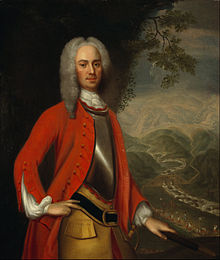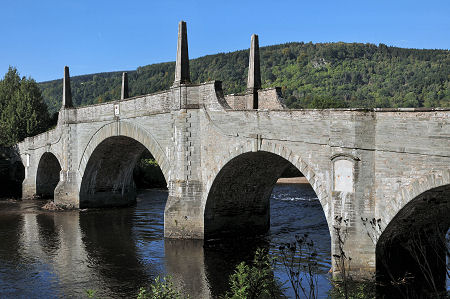Since we covered the Welsh Jacobites earlier this month for St Davids Day we felt it only fair to turn our heads to the Irish for St Patricks Day.
This time rather than focusing on the whole Irish section we decided to just pick one man; George Wade.

Born in 1673 in Killavally in Ireland, George Wade had a long military career. He fought in both the Nine Years War and the War of Spanish Succession before becoming commander of the British forces in Ireland in November 1714. In 1715 he join in the fight against the Jacobite Rising and undertook security duties in Bath where he unearthed a haul of Jacobite weapons. He is said to have helped counter several plots in England, and at one point even arrested the Swedish ambassador in London.
Perhaps the thing Wade is most well known for though is his roads. In 1724 George I’s government sent Wade to Scotland to inspect the state of the country. It is said when he first visited he found the Highlands in ‘a state of anarchy and confusion’, and virtually inaccessible to his troops. He recommended the construction of barracks, bridges and proper roads to assist in the control of Scotland. On 10 May 1725 he was appointed Commander in Chief of His Majesty’s forces, castles, forts and barracks in North Britain and was tasked with carrying out his own recommendations.
Over the next twelve years Wade directed the construction of some 240 miles (390 km) of roads and 40 bridges linking garrisons at Ruthven, Fort George, Fort Augustus and Fort William. The roads were designed to be sixteen feet wide and like Roman roads were ideally built in a straight line. Every ten miles soldier camps were formed with inns often developing alongside, some of which can still be seen today. Indeed much of Wades work can still be seen today including the five arch Tay Bridge at Aberfeldy which is known as ‘General Wades Bridge’ and reportedly cost over £4,000.

Wade was also responsible for raising a militia called the Highland Watches. The first six companies were formed in 1725, with another four in 1739. The men were recruited from clans loyal to the crown: Campbell, Fraser, Munro and Grant and were designed to prevent fighting between the clans, deter raiding and enforce the new disarmament laws. These six independent companies were eventually brought together in 1739 to become the Black Watch Regiment and were, for many years, the only troops allowed to wear tartan of any kind.
In 1745 Wade was called back from retirement at the age of 72, to aid in stopping the ’45 Rising but his role was minor and inglorious. Based in Newcastle his troops failed to intercept the Jacobite army on its campaign south to Derby and again on its dejected return north to Scotland. Wade was replaced as Commander-in-Chief by the Duke of Cumberland who eventually led the government army to victory at Culloden.
Wade died in 1748 and was buried in the centre aisle of the nave in Westminster Abbey. He was unmarried but left four illegitimate children, George, John, Jane and Emilia.
We hope you enjoyed this little insight into Wades life. As always please like, tweet, share, comment and why not take a journey along some of Wades roads.
All the best, K & D
Very interesting. I’ll add a little rhyme my father taught me: “if you had seen these roads before they were made, you would lift up your hands and bless General Wade.”
Roads certainly built to last. When they have repeated incidents of rocks falling down onto the road at the Rest and be Thankful, traffic has more than once been re-directed onto General Wade’s old road down in the valley bottom.
LikeLiked by 1 person
That’s really interesting, Maggie. Still amazed how old things last hundreds of years and new things need constant replacement.
LikeLike
Wade’s name doesn’t just appear in rhyme but also in the third verse of a fairly well known Wee tune.
God grant that Marshall Wade,
Will by thy mighty aid,
Victory bring.
May he sedition hush,
And with a torrents rush,
Rebellious Scot’s,
To crush.
God Save The Queen.
LikeLike
[…] roughly 85 men began to make the journey south to Fort William marching along the roads built by General Wade after the 1715 Rising. Prince Charles was not idle though. He heard of the Governments plan and […]
LikeLike
[…] Loch you can also find the Fort Augustus, which in 1715 was built to become the headquarter of the English General Wade, and its a very popular tourist location. Also, take a stroll around the Spean Bridge, it offers an […]
LikeLike
[…] Loch you can also find the Fort Augustus, which in 1715 was built to become the headquarter of the English General Wade, and its a very popular tourist location. Also, take a stroll around the Spean Bridge, it offers an […]
LikeLike